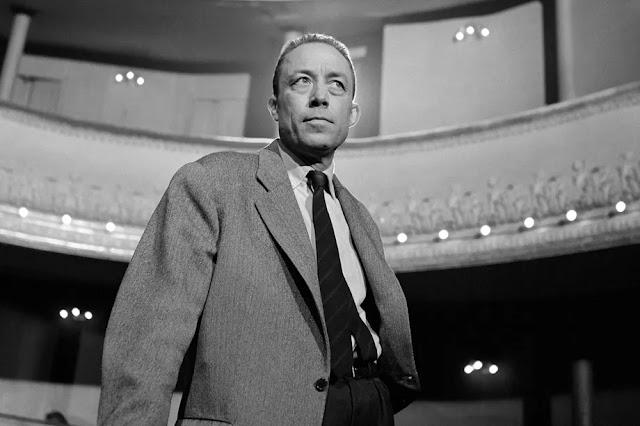
There is an indifference within the human condition, as much it can at times portray such a ferment decisiveness against its own self. Through its predicament of attempting to understand reality, relayed by fears and anxiety internalized – but the greater weight of what truly can be defined as an indifference to humanity, is nature. The construct of the natural world, that could not care less if we all vanished tomorrow. It neither aspires nor projects a like or dislike of our hopes, desires and dreams, rather nature beyond the aesthetics, even if one deems grateful of the sustainability as a comfort of living, would be foolish to overlook its hostility. And for the civilizations that have risen and fallen in history, they would look to the gods or god as a reverence of being judged for disobeying the omniscience mandates. Yet, Albert Camus's own version of the early idealisms of the "Absurd" derived from Søren Aabye Kierkegaard's Absurdity, is to live under an Absurd existence without being burdened by it. However Camus, unlike Kierkegaard, struggled with trying to define a God within an absurdist world. Camus didn't see any point, rather, he removed not just god from his own viewpoints but also the nature of being. To understand Camus's projections of the Absurd, is to read one of his most important works L’Étranger or "The Stranger " (1942).
“...As if this great outburst of anger had purged all my ills, killed all my hopes, I looked up at the mass of signs and stars in the night sky and laid myself open for the first time to the benign indifference of the world- and finding it so much like myself, in fact so fraternal, I realized that I’d been happy, and that I was still happy. For the final consummation and for me to feel less lonely, my last wish was that there should be a crowd of spectators at my execution and that they should greet me with cries of hatred.”
The story of The Stranger keeps in step with Camus's later writings that is the burden of life and how life, within that onus can still be seen, defined by the Absurd as worth living. The character Meursault a French/Algerian, who kills an Arab man, paradoxically is the prelude into Meursault's rebellion to existence. As the protagonist or more so an antihero, despite murder as the template for his upcoming execution. It is the compression of life and what it is to live within a segment of time – which is short. We see Meursault detach from reality or a perceived reality of existence, that he feels liberated from and begins to see a happiness before his own death. As Camus himself once commentated on the main character as a person “Who doesn't play the game.” With moral dispositions aside, what we see formulating from the idealisms of Absurd existence or at least Camus a philosophical writer, is that life in all the variants of indifferences. One could see that life is worth living regardless of actions of both nature and the human emotion. That fate, luck and predicaments of unknown futures are meaningless within points in time.
It is Camus's antiheroes, rogues and lonely travelers throughout singular aspects of history; yet are only relevant in now time. This can be seen in his essay "The Rebel" (1951). What is sustainable in a revolution? And who perpetrates it? Does the artist or writer really care to overthrow. Or rather document their own rebellion against status quo or the fact they feel alienated by it. Later this can be seen in Camus's "The Fall" (1956), once again a stranger by the name of Jean-Baptiste Clamence, sitting in a neutral setting, a bar, talking to a Parisian Lawyer. It is this discussion of morals and bases for reality set against a monologue dialogue. There is drinking and conversation. An introspection of what it is to be indifferent. And these indifferences that the characters feel. The question/s Camus asks. Is it empowering? Do I doubt this life? Can I change this? What is the reasoning of existence? As the stranger, an outsider views the wars fears and prejudices of a society that has cast them out. Camus then rises to challenge and asserts the significance of the stranger. Without discord or opinion, anymore more or less than nature its self. He or she becomes settled as they embrace the turmoil of existence. And through that tumultuousness and burden of life. They find happiness.
"Don't lies in the end put us on the path to truth? And don't my stories, true or false, point to the same conclusion? Don't they have the same meaning? So, what does it matter whether they are true or false if, in either case, they signify what I have been and what I am? One can sometimes see more clearly in a person who is lying than in one who is telling the truth. Like light, truth dazzles. Untruth, on the other hand, is a beautiful dusk that enhances everything."
Albert Camus (1913 - 1960)



Comments
Post a Comment